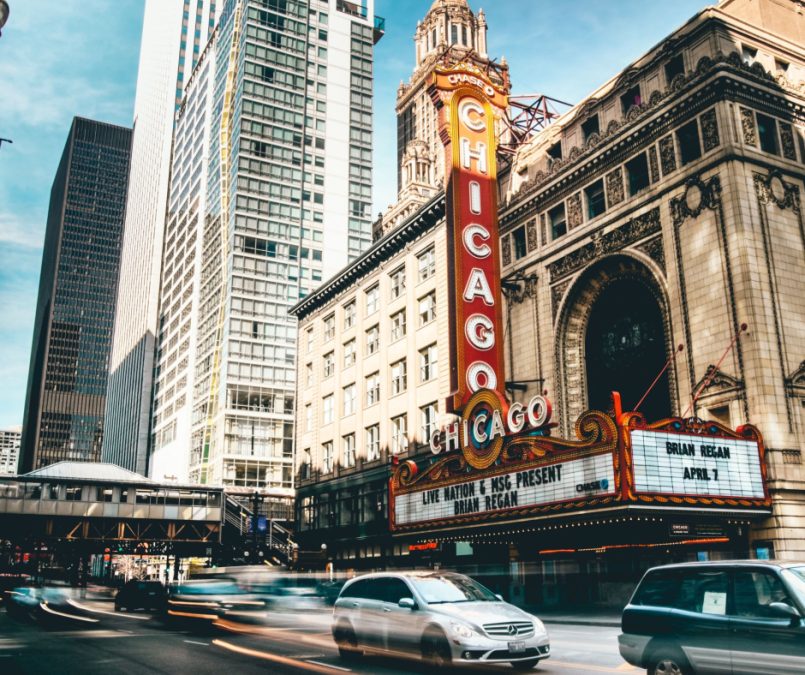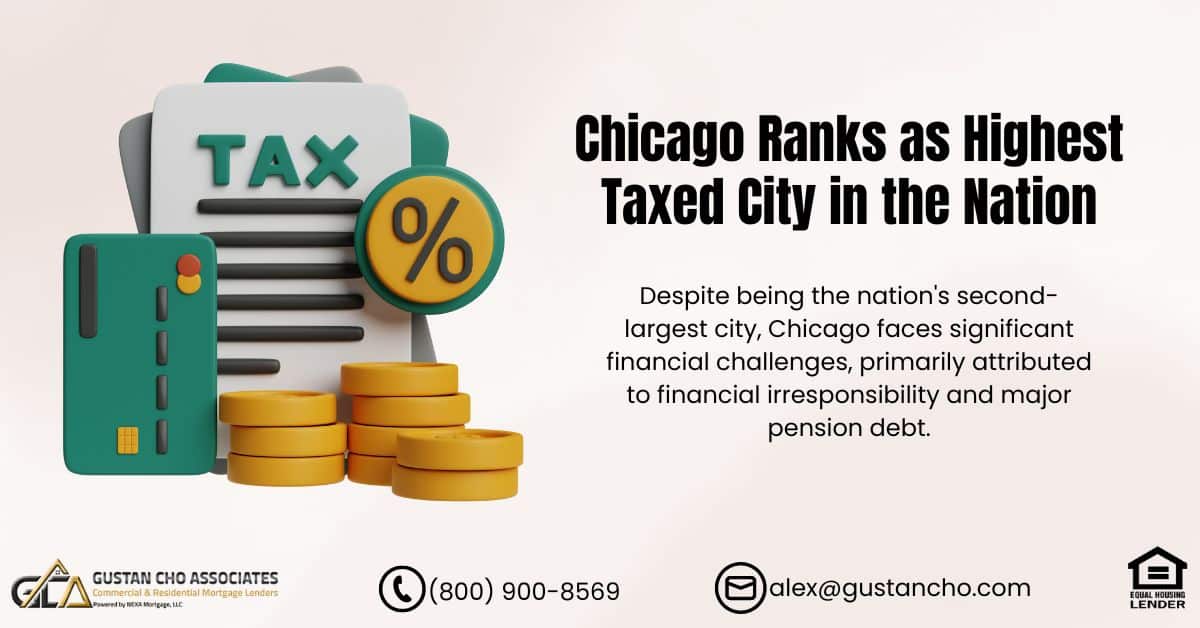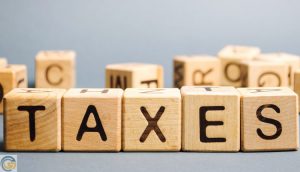Chicago, renowned as the nation’s second-largest city, claims the dubious title of the highest-taxed city in the United States. With its breathtaking downtown skyline and status as a global economic hub across various sectors, Chicago is a beacon of urban grandeur. Yet, beneath its surface lies a city grappling with significant financial challenges exacerbated by its tax burden.
Dustin Dumestre, a senior loan officer at Gustan Cho Associates, sheds light on Chicago’s tax ranking, emphasizing its monumental architectural feats, prominent educational institutions, and robust international economic influence. However, despite its allure and economic prowess, recent data underscores Chicago’s unwelcome distinction as the most heavily taxed city in the nation.
Chicago is home to three of the world’s largest buildings. It is also the home of major colleges and universities. Chicago has a major international economic engine for all industries.
The city borders beautiful Lake Michigan. Chicago also attracts millions of national and international visitors. Recent data shows Chicago ranks as highest taxed city in the nation.
In this comprehensive exploration, we delve into the multifaceted issues plaguing Chicago:
- Chicago’s Aesthetic Charm and Economic Woes: Despite its beauty, Chicago faces a looming financial crisis.
- They are earning the Top Tax Spot: Analyzing Chicago’s ranking as the highest taxed city in the U.S.
- Political Mismanagement and Corruption: Unraveling the repercussions of financial irresponsibility and political corruption.
- Exodus Due to Tax Burden: Examining the mass exodus of residents from Chicago and Illinois driven by excessive taxes.
- Cost of Living Disparities: Contrasting the cost of living between Chicago and its suburban counterparts.
Chicago’s fiscal landscape is dire, with its highest-taxed status exacerbating existing financial woes. Despite this glaring issue, the city’s leadership remains embroiled in a cycle of ineptitude and fiscal mismanagement, steering Chicago perilously toward bankruptcy. In this exposé, we confront head-on the financial turmoil besieging the Windy City.
The Landscape of the Nation’s Largest Second City
Chicago’s allure is undeniable, attracting thousands of primary and secondary homebuyers to its lakefront condos. Renowned for its culinary prowess, the city boasts top-rated restaurants, including internationally-ranked ethnic eateries. Notably, Chinatown stands as the nation’s third-largest. However, akin to other major metropolitan areas, Chicago grapples with its share of challenges.
Recent data reveals a stark reality: Chicago ranks as the highest taxed city in the nation. Despite imposing the most substantial tax burden among major U.S. cities, Chicago is in dire financial straits, largely stemming from fiscal mismanagement and hefty pension liabilities.
The city explores avenues to boost tax revenues to address its financial woes. Mayor Brandon Johnson and other city officials pin their hopes on other sources of income. This article delves into why Chicago ranks as highest taxed city in the nation.
Pre-qualify for a mortgae loans, click here
Chicago Ranks as Highest Taxed City Along with Two Other Cities
Among two other cities, Chicago ranks as the highest taxed city in the nation. The city must address its financial deficit promptly. The continuous rise in the city’s sales tax is a direct consequence of revenue shortages.
Despite attracting millions of visitors, both domestically and internationally, Chicago’s status as the highest taxed city in the nation is burdensome for taxpayers.
Moreover, it faces the highest out-migration rate compared to other major U.S. cities. Many taxpayers are departing due to the city’s exorbitant tax rates. Notably, Chicago boasts the country’s highest combined state and local sales tax rates, as per a recent report from the Tax Foundation.
Costs of Living in Chicago

It is one thing to live in a city with the highest tax rate in the nation. It is another thing if the taxes keep increasing due to mismanagement of tax revenues. Chicago is in a financial deficit crisis. The city’s pension debt is in critical condition. The city has a major shortage of police and firefighters.
With the new budget allocated to pay for new police officers and firefighters, most of the money will cover the pension shortage. The city needs more police officers to catch up with retiring police officers and the growing crime rate.
Chicago still ranks as the murder capital of the Nation. The city is one of the most beautiful cities in the world. Many benefits of living in the Second City, such as public transportation, the best ethnic restaurants, major universities, the downtown business district, and enjoying the world’s most beautiful downtown. Living in the city is not cheap.
How Much Does it Cost Living in Chicago?
Two other major cities in the U.S. share the same rankings as the Nation’s top-taxed state. California’s cities Long Beach and Glendale, California, share the top spot with Chicago. The report examined cities with over 200,000 people.
How high is tax in Chicago?
Chicago’s tax rates can vary depending on the type of tax. For example:
- Sales Tax: The combined sales tax rate in Chicago, including state, county, and local taxes, is among the highest in the United States, often exceeding 10%.
- Property Tax: Compared to other major cities in the U.S., Chicago has relatively high property taxes. The exact rate depends on various factors, including the property’s assessed value and applicable exemptions.
- Income Tax: The state of Illinois implements a flat income tax rate that is applicable across the entire state. However, Chicago residents may also be subject to additional local income taxes.
While tax rates can fluctuate, Chicago ranks as highest taxed city in the country due to its combination of sales, property, and income taxes.
Is Illinois the highest taxed state?
Illinois consistently ranks among states with high tax burdens due to property taxes, sales taxes, and a flat income tax rate. While it may not always be the highest-taxed state in every category, its overall tax burden is significant, especially in areas like Cook County, where property and sales taxes are notably high.
Chicago Ranks as Highest Taxed City and Breakdown
Chicago Taxpayers pay the following:
- City taxes of 1.25%
- Cook County taxes of 1.75%
- Transit authority 1%
- Illinois state taxes of 6.25%
- Total sales tax rate of 10.25%
The above taxes can affect a taxpayer’s disposable income. Property taxes in Chicago are higher than outside city limits.
Chicagoans are Going Outside City Limits to Avoid High Taxes
Chicago, renowned for its budget-conscious residents, often shop outside the city or go online shopping. Situated within Cook County, many Chicagoans regularly traverse the city borders to neighboring areas for fuel, groceries, and retail needs.
However, as of January 1st, 2020, online shoppers must remit Illinois state sales tax, further contributing to the tax burden. When combined with property taxes, these levies accumulate significantly. Consequently, Chicagoans pay the most taxes out of any city taxpayer in Illinois, solidifying the city’s status as the highest-taxed city in the state.
Call us if you want to purchase your own house
Itemized Taxes Charged In Chicago Versus Outside The City
Check out the chart provided, which delves into twenty-four tax categories, including cell phones, cigarettes, and ridesharing. According to the data, Chicago ranks as highest taxed city in ten out of these twenty-four taxes.
Residents of Chicago face a dual burden. The city not only imposes significant taxes on its citizens, but the state of Illinois also exacerbates the situation with the highest tax rate nationwide.
The Exodus of Illinois Taxpayers to Lower-Taxed States
Chicago ranks as highest taxed city in the nation, with Illinois boasting the highest tax rate overall. Additionally, Illinois holds the second-highest property tax rate nationwide. Recently, Governor J.B. Pritzker of Illinois sanctioned 20 new taxes for state taxpayers, excluding potential increases to existing taxes. One notable instance is approving a bill doubling the state’s gas tax.
Consequently, Pritzker’s popularity among Illinois taxpayers is waning. His proposed shift from the state’s current flat tax to a progressive system further fuels the discontent.
Illinois Governor JB Pritzker’s Progressive Tax Proposal Fails
Chicago ranks as highest taxed city in the nation and faces an impending exodus of high net-worth individuals due to the implementation of a new progressive tax system. This shift will likely compel many high-wage earners to seek residence in states with lower tax rates. Additionally, the decision by J.B. Pritzker to approve a bill granting state lawmakers a wage increase has only served to aggravate Illinois residents further.
The trend of Illinoisans relocating to states with lower tax burdens is not limited to individual taxpayers; there’s also a significant departure of businesses.
For instance, Midland Metals Products, a Chicago-based company, recently moved its operations to neighboring Indiana, citing lower taxes and operational expenses. This relocation resulted in the loss of 150 jobs in Chicago.
The trend of Illinoisans relocating to states with lower tax burdens is not limited to individual taxpayers; there’s also a significant departure of businesses. For instance, Midland Metals Products, a Chicago-based company, recently moved its operations to neighboring Indiana, citing lower taxes and operational expenses. This relocation resulted in the loss of 150 jobs in Chicago.
Reforming City Government
Chicago is a very beautiful city with tons of potential. The U.S. economy is booming. The majority of cities in the nation are raking in billions. Most well-run cities have a healthy reserve fund. This is not the case with Chicago. Chicago Ranks As Highest Taxed City In The Nation for a few obvious reasons.
The city needs a competent mayor experienced in running a profitable organization. You cannot spend more than what you take in. Every politician in the world wants to provide everything free. That is not how simple Economics 101 works. Mayor Brandon Johnson needs to run the city like a government. He needs to privatize as many departments as possible to save costs.
Reform in Chicago
The Mayor needs to cut expenses by consolidating major city departments and divisions. He needs to stop patronage. He needs to run the city in a bi-partisan way. The city has a long reputation for corruption and patronage.
Countless city employees, political appointees, and elected officials have been indicted, convicted, and sent to prison. Four Illinois governors have been convicted and sent to prison for fraud, bribery, and other wrongdoing. The newly elected Illinois governor, J.B. Pritzker, is under federal criminal investigation for property tax appeals fraud.
Many city, county, and state politicians are currently under investigation. They are either under indictment, arrested, or in court for wrongdoing. Both the city of Chicago and the state of Illinois need reform. Get rid of corruption. Elect competent politicians for state, county, and city offices.
Fix the fiscal irresponsibility that has been going on for decades. Fix the pension system. Do something to attract businesses, corporations, and residents. Being ranked as the highest-taxed city and state in the Nation will not attract new businesses—or individual taxpayers. With competent, experienced, humble politicians, Chicago and Illinois can be great city and state again.
FAQ: Chicago Ranks as Highest Taxed City in the Nation
1. Why is Chicago considered the highest-taxed city in the nation? This article explores recent data indicating that Chicago is the highest-taxed city in the United States. Despite being the nation’s second-largest city, Chicago faces significant financial challenges, primarily attributed to financial irresponsibility and major pension debt.
2. What topics does the article cover regarding Chicago? The article delves into various aspects of Chicago, including its beauty and financial crisis, ranking as the highest-taxed U.S. city, issues related to financial mismanagement, political corruption, the mass exodus of residents due to high taxes, and a comparison of the cost of living between Chicago and its suburbs.
3. What challenges does Chicago face due to its high tax rates? Despite having the highest tax rates among major U.S. cities, Chicago grapples with financial struggles. The article attributes this to financial mismanagement, major pension debt, and a looming deficit. Efforts to increase taxes, such as through marijuana sales, are explored.
4. How does Chicago’s tax burden affect its residents? Chicagoans face a double whammy, contending with high city taxes and Illinois having the highest tax rate in the United States. The exodus of residents and businesses to lower-taxed states is discussed, along with the impact of newly approved taxes by Governor J.B. Pritzker.
5. What do Chicago residents pay some specific taxes? Chicago taxpayers pay various taxes, including city taxes of 1.25%, Cook County taxes of 1.75%, transit authority tax of 1%, and Illinois state taxes of 6.25%, resulting in a total sales tax rate of 10.25%. City property taxes are also highlighted as higher than in the surrounding areas.
6. How is Chicago addressing its financial crisis? The article suggests potential solutions to Chicago’s financial woes, emphasizing the need for competent leadership, fiscal responsibility, and reforms. It advocates for privatization, cost-saving measures, the elimination of patronage, and a bipartisan approach to governance.
7. Are there comparisons with other cities regarding taxation and out-migration? Yes, the article compares Chicago’s taxation issues with two other cities—Long Beach and Glendale in California. It also highlights the mass exodus of residents and businesses from Illinois to lower-taxed states, citing examples of companies relocating for lower taxes.
8. How does the article propose reforming Chicago’s government? The article suggests that Chicago needs competent, experienced, and humble politicians to address corruption, fiscal irresponsibility, and the pension system. It advocates for attracting businesses and residents through effective governance, eliminating corruption, and fostering a more favorable economic environment.
9. What is the overall message regarding Chicago’s future? The article conveys a message of hope for Chicago’s future, emphasizing the potential for greatness with competent and responsible leadership. It underscores the importance of addressing financial challenges, attracting businesses, and fostering a positive resident environment, ultimately aiming for the city’s resurgence.








